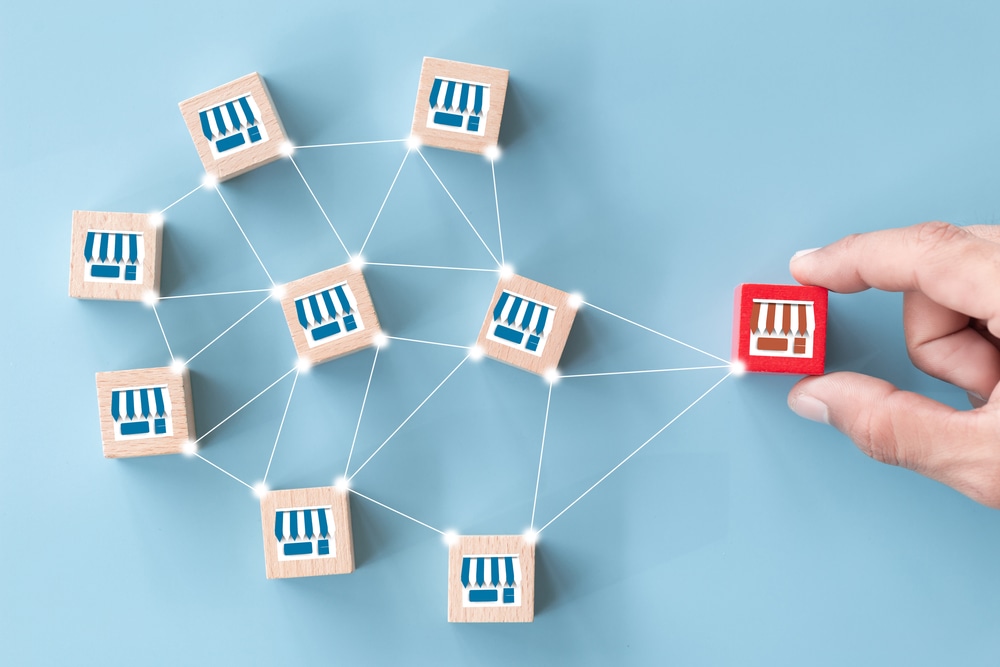What Makes a Chain
A chain business is comprised of a group of stores (two or more) that possess the same brand name, adhere to the same corporate policies, sell the same products, and are all owned by the same parent company. Wal-Mart is an example of a mass retail supermarket chain. Chain businesses may be local, regional, nationwide, or global, depending on the brand.
Since they are corporate-owned, chain stores are owned and operated by the parent company. The stores do not retain independent owners. All profits or losses accrued at each location are assumed by the parent corporation. Subsequently, they are responsible for running daily operations, managing employees, and every other aspect of the business.
What Makes a Franchise
Many successful businesses and corporations will offer franchising opportunities to qualified investors.
Through a franchised business, the franchisor can tap into as many streams of capital as it has franchisees. While they still bear some financial responsibility, the main costs of opening new store locations are incurred by the franchisees and paid out through franchise fees, covering everything including real estate, equipment, inventory, working capital, and much more. Franchisees must pay an ongoing royalty fee to the franchisor, as well as follow the business protocol and corporate policies set by the franchise company.
The guidelines that the franchisees must adhere to are laid out in the Financial Disclosure Document (FDD). Upon signing a franchise agreement, each franchise location is required to follow the outlined guidelines; unless otherwise indicated. These guidelines include operating procedures, designated hours of operation, products, employment practices, and more.
The Differences
Simply put — within a chain business, a parent company owns each location. With a franchise, different stores or branches are owned by separate individuals who are solely responsible for daily operations. Still unsure of the finer distinctions between franchise vs. chain? Let’s dive in a bit further.
Ownership Structure
Chain stores are fully owned and managed by the parent corporation on behalf of the shareholders. A franchise location, on the other hand, is owned by a franchisee (an independent investor). There is, of course, a middle ground. Companies like McDonald’s have franchise-owned restaurants and corporate-owned restaurants within their network. Ultimately, both business formats must follow similar guidelines and corporate policies.
Financing
Gathering funds to finance brand growth is one of the biggest incentives that prompt companies to franchise. Businesses that maintain a chain store model must seek financing solely through lenders or reinvested profits. Franchisees pay initial investment fees and predictable ongoing royalties that help sustain the expenditures of the franchise. As a whole, franchise businesses are more likely to experience faster growth than their chain store counterparts, mainly due to financing.
For those seeking to open their own business as a franchise owner, initial investment costs will include the franchise fee, marketing fees, travel, etc. By avoiding the potential financial pitfalls of an independent business venture, buying a franchise is much more cost-friendly. And, if you require external financing to make your business dreams a reality, the probability of securing a loan is much higher with a franchise brand backed by a strong reputation and a sustainable growth record.
Cost of Doing Business
A franchise-owned store typically has lower overhead and fewer costs of operations than a similar chain store. For example, the franchisee can act as the manager and take care of costly expenses like serving, cleaning, etc. Alternately, most chain stores have larger payrolls.
Profits
It is important to know not only how much a store makes but where the money goes. Within the chain model, the profits (and losses) and operational functions stay within the corporation. When it comes to a franchise model, the franchisor shares everything with the franchisees. Franchisees are independent investors; they have to be “in the know” about the franchisor’s success before investing.
Claim Your Future with Franchising
Franchising is a mutually beneficial arrangement between the franchisor and you, the passionate, dedicated entrepreneur. Franchisors benefit from expanding their influence and customer base, while the franchisee can capitalize on a brand’s time-tested business model, popularity, and marketing network.
Franchising is ideal for ambitious entrepreneurs who don’t want to start their businesses from scratch. The time and effort to develop a winning formula has been established by the corporation, so you can start your journey with all the advantages of a world-class brand that is invested in your success.
Find Your Way with Wayback Burgers
Currently operating in over 32 states and international locations, Wayback Burgers has demonstrated its commitment to innovation and growth as a leader in the fast-casual restaurant industry. We approach food and business with the same honest, uncomplicated philosophy, and welcome like-minded entrepreneurs to join our family.
Visit us to hear our franchisee testimonials and learn more about opportunities with Wayback Burgers in your area.

